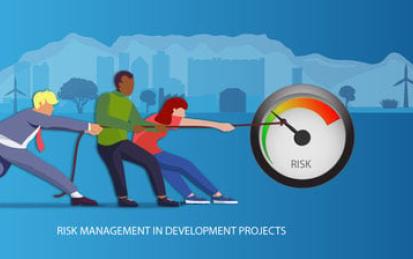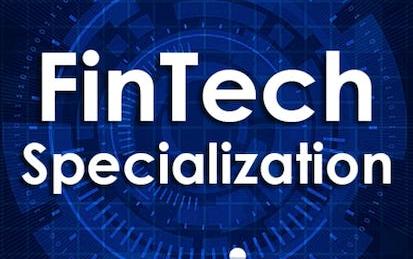

دوراتنا

Advanced Topics in Derivative Pricing
This course discusses topics in derivative pricing. The first module is designed to understand the Black-Scholes model and utilize it to derive Greeks, which measures the sensitivity of option value to variables such as underlying asset price, volatility, and time to maturity. Greeks are important in risk management and hedging and often used to measure portfolio value change. Then we will analyze risk management of derivatives portfolios from two perspectives—Greeks approach and scenario analysis.
-
Course by

-
 Self Paced
Self Paced
-
 16 ساعات
16 ساعات
-
 الإنجليزية
الإنجليزية

Risk Management in Personal Finance
This course is primarily aimed at those who want to understand more about how they can protect their finances from unexpected events. Taught by a CERTIFIED FINANCIAL PLANNER™ Professional, this course covers the role insurance plays into your financial plan, including what kinds of insurance to explore, how to determine how much insurance you need, and how different kinds of insurance works. The course includes life insurance, health insurance, disability insurance, homeowners insurance, renters insurance, auto insurance, and umbrella insurance.
-
Course by

-
 Self Paced
Self Paced
-
 7 ساعات
7 ساعات
-
 الإنجليزية
الإنجليزية

An Introduction to Credit Risk Management
What is credit risk? Why is it so important, in modern economies, to correctly deal with it? This course combines theory with practice to answer these questions.
-
Course by

-
 32
32
-
 الإنجليزية
الإنجليزية

Healthcare Finance, Economics and Risk
Gain the knowledge of financial systems needed to be a leader or administrator in the healthcare industry and how they impact strategic planning, quality assurance and risk management initiatives.
-
Course by

-
 23
23
-
 الإنجليزية
الإنجليزية

Insurance Reserving, Risk Management and Analysis of Key Performance and Financial Indicators
Learn the key performance and financial indicators that will allow you to analyze and value an insurance company.
-
Course by

-
 Self Paced
Self Paced
-
 5
5
-
 الإنجليزية
الإنجليزية

Introduction to Human Resources (HR) leadership and HR management strategies
This introductory course will introduce the learner to ‘strategic HR’ as a key, value-adding function in the organization – helping it to achieve its business objectives. It will unpack key concepts from a strategic HR point of view, such as ‘ethics and governance’, ‘HR risk management’ and a ‘digital HR strategy’. Finally, it will consider the future of work and what a global HR strategy entails.
-
Course by

-
 Self Paced
Self Paced
-
 26
26
-
 الإنجليزية
الإنجليزية

Developing the Risk Management Plan with Expert Judgement
Every project faces risk. The project risk management plan (PRMP) is the fundamental instrument for identifying risks, managing, and responding. Projects based on new technology or new markets face the chance of those opportunities failing in some way. Learn how to leverage expert judgement to properly formulate a winning PRMP.
-
Course by

-
 Self Paced
Self Paced
-
 33
33
-
 الإنجليزية
الإنجليزية

Healthcare Analytics and Decision Making
Healthcare leaders deal with important challenges that can affect public health. Learn about health informatics solutions and financial systems needed to manage planning, quality assurance, risk management, and evidence-based decision-making.
-
Course by

-
 45
45
-
 الإنجليزية
الإنجليزية

Risk Management in Development Projects
Learn to preemptively manage positive and negative events that may affect the execution of a development project.
-
Course by

-
 الإنجليزية
الإنجليزية

Risk Management Tools and Practices
Learn how to compare and contrast economic capital, risk capital and regulatory capital.
-
Course by

-
 Self Paced
Self Paced
-
 الإنجليزية
الإنجليزية

Risk Management Professional Certificate Examination
Complete this exam to earn your professional certificate in Risk Management from the New York Institute of Finance.
-
Course by

-
 Self Paced
Self Paced
-
 الإنجليزية
الإنجليزية

Program Risk Management in ClickUp
By the end of this guided project, you will be fluent in creating Program Risk Management artefacts for the Planning Phase for diverse programs. You will utilise a logical diagramming plan in an agile environment to develop the solution. This will enable you to identify and classify the required components for risk planning and management. Furthermore, it will help develop a structural model for learning about the field of Program Management.
If you are interested in building up the knowledge leading to this guided project, the following is the link to:
-
Course by

-
 Self Paced
Self Paced
-
 3 ساعات
3 ساعات
-
 الإنجليزية
الإنجليزية

Optimization Methods in Asset Management
This course focuses on applications of optimization methods in portfolio construction and risk management. The first module discusses portfolio construction via Mean-Variance Analysis and Capital Asset Pricing Model (CAPM) in an arbitrage-free setting. Next, it demonstrates the application of the security market line and sharpe optimal portfolio in the exercises. The second module involves the difficulties in implementing Mean-Variance techniques in a real-world setting and the potential methods to deal with it.
-
Course by

-
 Self Paced
Self Paced
-
 14 ساعات
14 ساعات
-
 الإنجليزية
الإنجليزية

Design and Analyze Secure Networked Systems
In this MOOC, we will learn the basic cyber security concepts, how to identify vulnerabilities/threat in a network system. We will apply CIA basic security services in the triage of recent cyberattack incidents, such as OPM data breach. We will learn the risk management framework for analyzing the risks in a network system, and apply the basic security design principles to protect the data and secure computer systems. We will examine the trustworthiness of programs and data installed in our systems and show the proper way to verify their integrity and authenticity.
-
Course by

-
 Self Paced
Self Paced
-
 17 ساعات
17 ساعات
-
 الإنجليزية
الإنجليزية

Risk Management for Projects
Learn how to manage risk in your organization by using the best processes and procedures.
-
Course by

-
 16
16
-
 الإنجليزية
الإنجليزية

Security Principles
Welcome to course 1 of 5 of this Specialization, Security Principles. After completing this course, the participant will be able to: Discuss the foundational concepts of cybersecurity principles. - Recognize foundational security concepts of information assurance. - Define risk management terminology and summarize the process. - Relate risk management to personal or professional practices. - Classify types of security controls. - Distinguish between policies, procedures, standards, regulations and laws. - Demonstrate the relationship among governance elements. - Analyze appropriate outcom
-
Course by

-
 Self Paced
Self Paced
-
 5 ساعات
5 ساعات
-
 الإنجليزية
الإنجليزية

Financial Risk Management with R
This course teaches you how to calculate the return of a portfolio of securities as well as quantify the market risk of that portfolio, an important skill for financial market analysts in banks, hedge funds, insurance companies, and other financial services and investment firms. Using the R programming language with Microsoft Open R and RStudio, you will use the two main tools for calculating the market risk of stock portfolios: Value-at-Risk (VaR) and Expected Shortfall (ES). You will need a beginner-level understanding of R programming to complete the assignments of this course.
-
Course by

-
 Self Paced
Self Paced
-
 15 ساعات
15 ساعات
-
 الإنجليزية
الإنجليزية

Cybersecurity Risk Management Framework
Gain a holistic understanding of NIST cybersecurity fundamentals. You will learn about the RMF process and managing risk by identifying, assessing and responding to risk. Additionally, you will learn how to use the framework to assess an organization's cybersecurity risk and the steps to implement or improve a cybersecurity program. You will deep dive in to the NIST 800-171 document where you will learn how to understand each of the 110 requirements and how to satisfy each of them.
-
Course by

-
 Self Paced
Self Paced
-
 الإنجليزية
الإنجليزية

Operational Risk Management: Frameworks & Strategies
In the final course from the Risk Management specialization, you will be introduced to the different roles in risk governance and the benefits of establishing an operational risk management program at your own workplace. This course will highlight key elements of an Operational Risk Management framework and help you identify the appropriate elements to incorporate in your own program.
-
Course by

-
 Self Paced
Self Paced
-
 7 ساعات
7 ساعات
-
 الإنجليزية
الإنجليزية

Risk Management
This 4-course Specialization from the New York Institute of Finance (NYIF) is intended for STEM undergraduates, finance practitioners, bank and investment managers, business managers, regulators, and policymakers. This Specialization will teach you how to measure, assess, and manage risk in your organization.
-
Course by

-
 Self Paced
Self Paced
-
 الإنجليزية
الإنجليزية

Financial Engineering and Risk Management
This specialization is intended for aspiring learners and professionals seeking to hone their skills in the quantitative finance area. Through a series of 5 courses, we will cover derivative pricing, asset allocation, portfolio optimization as well as other applications of financial engineering such as real options, commodity and energy derivatives and algorithmic trading. Those financial engineering topics will prepare you well for resolving related problems, both in the academic and industrial worlds.
-
Course by

-
 Self Paced
Self Paced
-
 الإنجليزية
الإنجليزية

Credit Risk Management: Frameworks and Strategies
In this course, you will use business and industry analysis to understand companies, projects, business models, and financing proposals. You will then prepare qualitative risk analysis for specific companies to use as the basis for financial analysis, project analysis, and risk decisions. Lastly, you will understand how to use financial ratios and financial metrics to evaluate a company or project’s profitability, balance sheet, capital structure, and cash flow to assess overall financial performance and risk profile.
-
Course by

-
 Self Paced
Self Paced
-
 9 ساعات
9 ساعات
-
 الإنجليزية
الإنجليزية

Project Management
The Project Management specialization is designed to be an introduction to the project management discipline, including the concepts, tools, and techniques used in the management and leadership of projects. Key topics covered include the role of the project manager; the project team; cost, schedule and risk management; quality in projects; and the project lifecycle. The courses in this specialization can be taken for academic credit as part of CU Boulder’s Master of Engineering in Engineering Management (ME-EM) degree offered on the Coursera platform.
-
Course by

-
 Self Paced
Self Paced
-
 الإنجليزية
الإنجليزية

Introduction to Cybersecurity & Risk Management
In this case-based Specialization, you will be introduced to the field of cybersecurity through the world of security governance and risk management. Throughout this program, you will practice applying foundational concepts of security governance and risk management including: Creating security strategies that align with a company’s goals and objectives.Applying risk assessment techniques to real-world situations.Implementing effective security education, training, and awareness programs.
-
Course by

-
 Self Paced
Self Paced
-
 الإنجليزية
الإنجليزية

FinTech: Finance Industry Transformation and Regulation
Objective This Specialization is intended for finance professional who are seeking to develop skills and understanding of FinTech.
-
Course by

-
 Self Paced
Self Paced
-
 الإنجليزية
الإنجليزية



